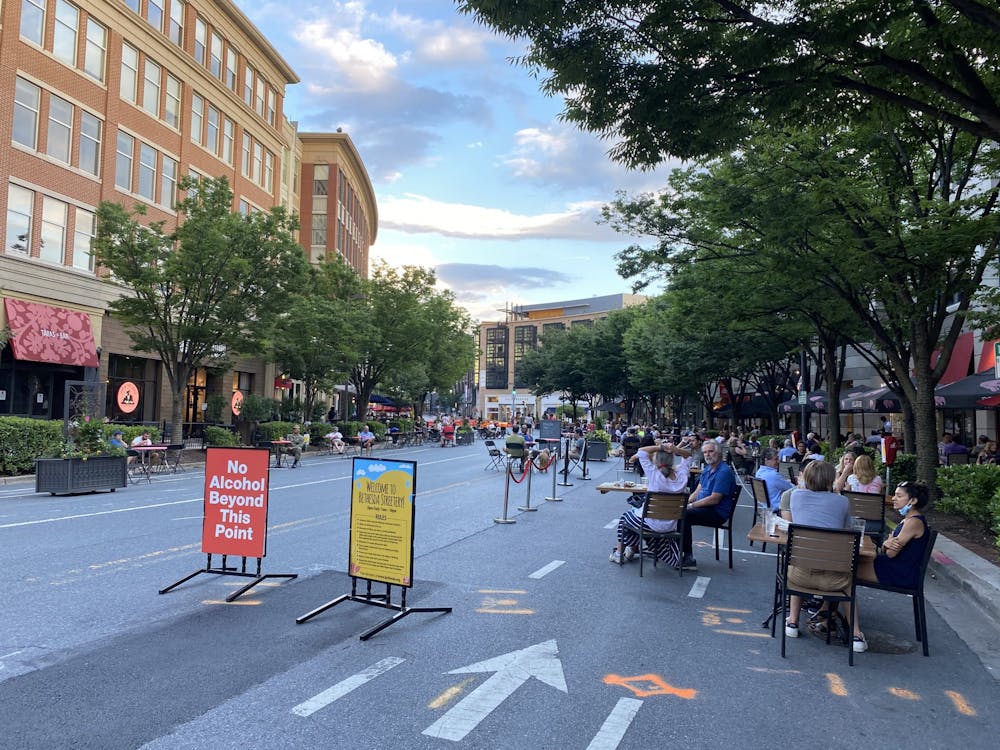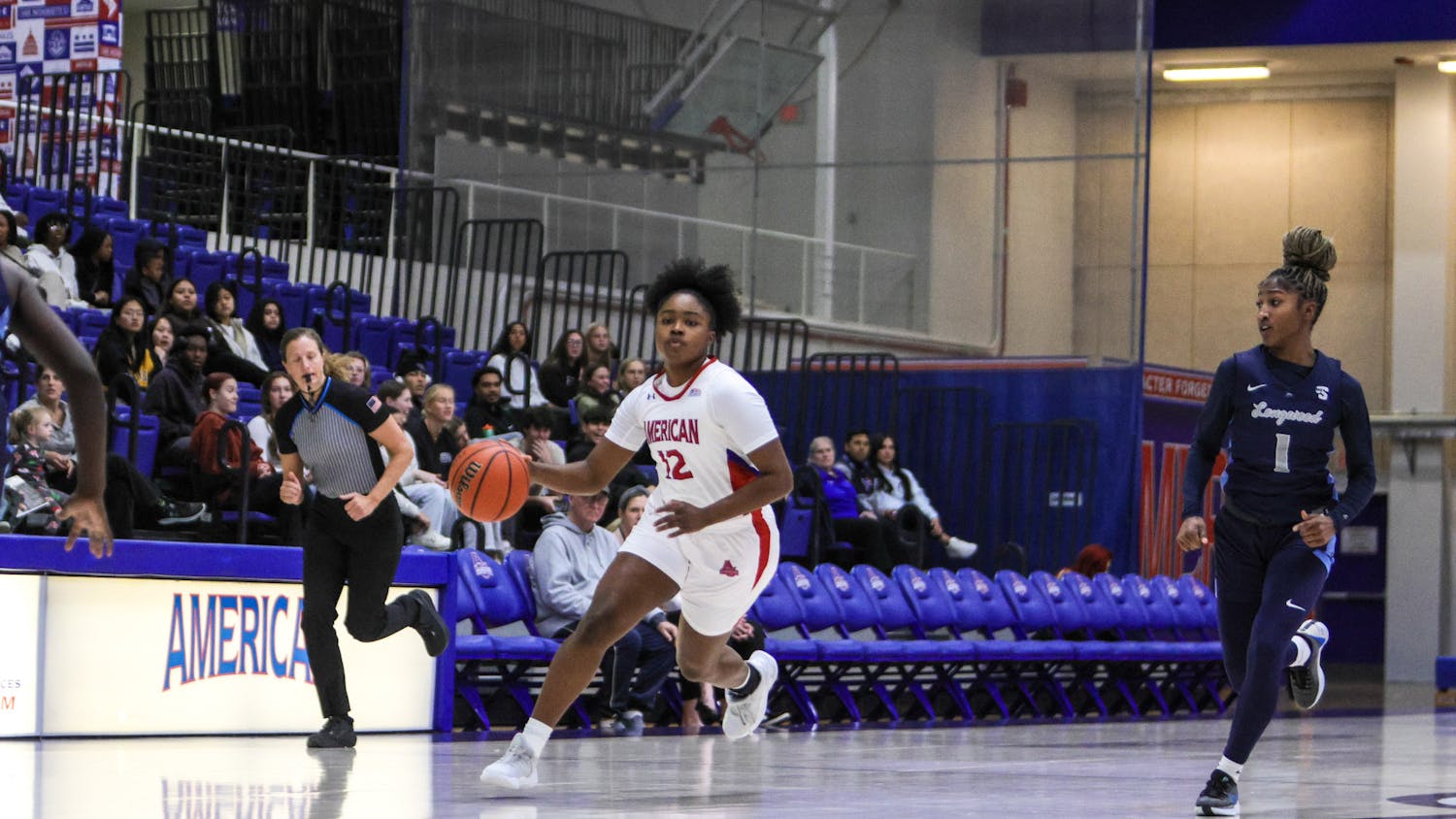Local restaurants are expanding their outdoor dining spaces into sidewalks and streets throughout the DMV area to establish blocks, now known as “streateries.”
Amid the coronavirus pandemic, D.C. Mayor Muriel Bowser announced on May 29 an initiative to close traffic lanes for socially distanced pedestrian traffic and outdoor table service for businesses. In phase one of the city’s reopening, businesses were able to have customers seated only in outdoor patios. Now, in phase two of reopening, which began June 22, restaurants can serve people indoors at half capacity.
By expanding outdoor spaces for restaurants, Bowser’s press release said that streateries would “support residents and businesses by sharing roads and sidewalks and making room for the social distancing that is critical to slowing the spread of COVID-19.”
Restaurants can apply for expanded outdoor space through the Mayor’s office. Advisory Neighborhood Commissions throughout the city can propose the closure of roadways and blocks to establish a “streatery.”
Adams Morgan closed down a block on 18th Street, the popular strip of bars, restaurants and coffee shops, on Friday, Saturday and Sunday so businesses could set up outdoor dining tables.
Based on Bowser’s order, the back of a chair needs to be six-feet apart from the adjacent table, and pedestrian sidewalk spaces need to be six-feet wide.
Joe Lapan, co-owner of Songbyrd Music House, said that a program like this has been talked about for a few years. Lapan is a member of the Adams Morgan Commercial Development Coalition, the body that helped plan and execute the streatery from June 26 to 28. The public health crisis and business owners’ concerns created urgency, Lapan said, to establish the program faster.
The streatery program has been a way to look at the future of “safe public spaces,” Lapan said. Adams Morgan’s ANC 1C approved the streatery plan unanimously, and the majority of the community, 85 percent, according to the coalition, had been in support of a program like this for a while, Lapan said.
According to Lapan, quarantine halted Songbyrd’s core revenue as a bar, restaurant and performance venue. The streatery was an opportunity to serve more visitors food and drinks, since the cafe closed in March.
Though this weekend was only the “pilot” for the program, Lapan said that he’s confident the program will continue. To keep maintaining the streatery, Lapan said, “the key focus is always of how the public health situation can be improved” and to “continue encouraging people to follow city guidelines.”
The weekend turnout at the streatery was small enough where visitors could “remain distant, wear masks and be safe,” Lapan said. He said that he’d be proud if the Adams Morgan program could be a model for other parts of the city that want to implement streateries, but his “focus all day every day is on Adams Morgan.”
Just outside of D.C., the Bethesda Urban Partnership, a Montgomery County organization dedicated to small businesses in Bethesda, established streateries on June 10. The streateries began when restaurants still were not allowed to seat patrons inside. On June 19, Montgomery County entered phase two of reopening, which allowed half capacity inside restaurants, but the daily streateries continued with tables spaced six-feet apart.
Montgomery County councilmember, Andrew Friedson, was part of organizing the streateries. When businesses began asking for help, he said The Council, the Bethesda Urban Partnership, the Department of Transportation and public health offices worked together to determine the safest way to begin operations. These organizations were not asking if the streatery could take place, but how it would be safest, he said.
The response to the streateries has been “overwhelmingly positive” from residents, Friedson said.
“This is something we believed we need[ed] to do,” he said. “We built it, they came and they’re coming.”
Five different areas of Bethesda have been closing traffic for dining, and residents are taking advantage of the opportunity to eat outdoors instead of taking food home. Restaurant owners have expressed gratitude at being able to expand their services.
Robert Blackwood, the general manager of Brickside, a Bethesda sports bar, said, they’re prioritizing safety, as “people are ready to get out.”
The first weekend the streateries opened, Blackwood said there were no empty tables. When Brickside was serving only carry-out food, their sales were down 90 percent, Blackwood said. The only people working in the restaurant were him and his chef.
Now the restaurant is down 65 percent in sales, and three-fourths of staff have come back to work, Blackwood said. Both the streatery program and federal small business loans have helped sustain the restaurant.
“We’re improving every week,” Blackwood said.
According to Friedson, the “whole idea of the streatery isn’t to create a party in the street.” Rather, it’s to “create a new normal that is safer” for businesses and residents. While being closely monitored for health and safety, Friedson said their public health data shows that transmission rates throughout the DMV area are “diminishing” even with streateries in full operation.
“The streatery is a reflection of being methodical and … relying on each other,” Friedson said.





